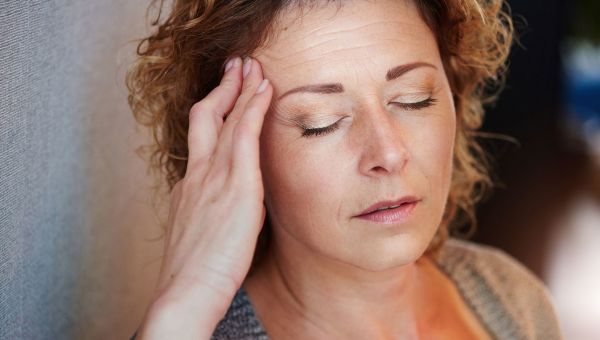5 health risks linked to Parkinson's disease
Parkinson's is connected to lung problems, depression, and more.
Updated on December 1, 2022

Parkinson’s disease, a debilitating condition in its own right, doesn’t operate in a vacuum. Once it starts progressing, it puts you at risk for a number of other conditions.
Parkinson’s is a brain and movement disorder. When you have it, the cells of the brain producing the chemical dopamine—responsible for movement, among other things—degenerate, leading to less and… Show More
Parkinson’s disease, a debilitating condition in its own right, doesn’t operate in a vacuum. Once it starts progressing, it puts you at risk for a number of other conditions.
Parkinson’s is a brain and movement disorder. When you have it, the cells of the brain producing the chemical dopamine—responsible for movement, among other things—degenerate, leading to less and less dopamine over time. This produces classic Parkinson’s motor symptoms like tremors, stiffness, slow movement, and poor balance.
Since Parkinson’s affects the brain, related symptoms and diseases can arise at the same time. “There’s been a sea change in the last few years in that we think about how Parkinson’s disease affects the whole brain instead of just the motor centers,” says neurologist Matthew Robertson, MD, with Portsmouth Regional Hospital in New Hampshire.
Here are five other symptoms or conditions that people with Parkinson’s might encounter.
Show Less
Depression
At least half of people with Parkinson’s also have depression, according to the Parkinson’s Foundation. Depression is caused in part by an imbalance in neurochemicals. “And in Parkinson’s, the disease process is changing the neurochemistry of the brain,” says Dr. Robertson. Many of the medications… Show More
At least half of people with Parkinson’s also have depression, according to the Parkinson’s Foundation. Depression is caused in part by an imbalance in neurochemicals. “And in Parkinson’s, the disease process is changing the neurochemistry of the brain,” says Dr. Robertson. Many of the medications used to treat Parkinson’s further alter brain chemistry, which may also contribute to depression.
There’s another reason that has little to do with brain chemistry. “Depression and mood disorders go hand-in-hand with overall function,” Robertson says. “In people who have lost some function, there’s a sense of invalidity or worthlessness that feeds into the syndrome of worsening mood disorders.”
Show Less
Pneumonia
Pneumonia is the top cause of death for people with Parkinson’s. It’s a muscle movement issue. “It’s aspiration pneumonia, not the kind of pneumonia you get when someone coughs on you,” Robertson says. “The principal issue is that swallowing is impaired.”
Swallowing is a movement, just like walking,… Show More
Pneumonia is the top cause of death for people with Parkinson’s. It’s a muscle movement issue. “It’s aspiration pneumonia, not the kind of pneumonia you get when someone coughs on you,” Robertson says. “The principal issue is that swallowing is impaired.”
Swallowing is a movement, just like walking, Robertson explains. “It comes down to muscle coordination,” he says. As Parkinson's progresses, the muscles that move food from the mouth down the esophagus and into the stomach stop working together effectively. As a result, it’s easier for food, mucus, and saliva to end up in the lungs instead of the stomach.
A healthy person can normally cough up food particles and saliva, but in someone whose throat muscles have trouble working, that might not be possible. Bacteria from the foreign particles then cause the lung infection that is pneumonia.
Show Less
Digestive trouble
Like the muscles responsible for swallowing, the muscles that help move food and waste through the digestive system can malfunction, which may cause constipation, nausea, and even malnutrition. “GI issues are incredibly common,” says Robertson. In fact, they’re the most common non-motor symptom of… Show More
Like the muscles responsible for swallowing, the muscles that help move food and waste through the digestive system can malfunction, which may cause constipation, nausea, and even malnutrition. “GI issues are incredibly common,” says Robertson. In fact, they’re the most common non-motor symptom of Parkinson’s.
Digestion relies in part on dopamine that’s produced in both the brain and nerve centers in the intestines; it signals the digestive tract to move food and waste through. Among other changes, Parkinson’s destroys the brain cells that generate dopamine—and it’s thought to damage the intestinal cells that produce dopamine, as well. Researchers even speculate that cell damage in the gut could indicate the start of Parkinson’s.
Show Less
Sleep disturbances
Sleep problems like insomnia, daytime drowsiness, and cycle disturbances often affect people with Parkinson’s. “There’s something inherent in Parkinson’s that makes people sleepy,” Robinson says. “We don’t really understand it yet. And a lot of medications that are used to treat motor symptoms have… Show More
Sleep problems like insomnia, daytime drowsiness, and cycle disturbances often affect people with Parkinson’s. “There’s something inherent in Parkinson’s that makes people sleepy,” Robinson says. “We don’t really understand it yet. And a lot of medications that are used to treat motor symptoms have a side effect of sleepiness.” Parkinson’s motor symptoms like rigidity and tremors can also keep people awake.
Another problem people with Parkinson’s experience is REM sleep behavior disorder. In the stage of sleep known as rapid eye movement, or REM, most muscles are paralyzed, except for the diaphragm and those that control the eyes. In people with Parkinson’s, that paralysis doesn’t always happen. As a result, people with REM sleep behavior disorder may act out their dreams. “The more vivid or violent the dream, the more the reenactment,” says Robertson.
Show Less
Dementia
Up to 75 percent of people with Parkinson’s develop dementia after about 10 years—and the brain changes are also common to Alzheimer’s disease and other forms of dementia. Symptoms of Parkinson’s-related dementia can include impulsivity, hallucinations, memory and concentration problems,… Show More
Up to 75 percent of people with Parkinson’s develop dementia after about 10 years—and the brain changes are also common to Alzheimer’s disease and other forms of dementia. Symptoms of Parkinson’s-related dementia can include impulsivity, hallucinations, memory and concentration problems, and paranoia. It may also make depression and sleep disturbances worse.
Some of the medications used to treat Parkinson’s can cause more or stronger dementia symptoms. Robertson says it’s a balancing act. “Early on, people may be bothered mainly by the motor symptoms. Later those symptoms may still trouble patients, but they may be superseded by medication side effects,” he says. “Maybe at that point we’ll step back the medications. You have to pick your battles.”
Show Less
Parkinson’s Foundation. Depression. Accessed November 29, 2022.
Parkinson’s UK. Drug Treatments for Parkinson’s. Last updated July 2019.
Chang YP, Yang CJ, et al. Risk factors for pneumonia among patients with Parkinson's disease: a Taiwan nationwide population-based study. Neuropsychiatr Dis Treat. 2016 Apr 27;12:1037-46.
Won JH, Byun SJ, et al. Risk and mortality of aspiration pneumonia in Parkinson’s disease: a nationwide database study. Scientific Reports. 2021. 11, Article number: 6597.
Merck Manual Consumer Version. Aspiration Pneumonia and Chemical Pneumonitis. Medically reviewed September 2022.
Poirier AA, Aube B, et al. Nonmotor Symptoms of Parkinson’s Disease: Gastrointestinal Ramprasad C, Douglas JY, Moshiree B. Parkinson's Disease and Current Treatments for Its Gastrointestinal Neurogastromotility Effects. Curr Treat Options Gastroenterol. 2018 Dec;16(4):489-510.
Zheng LF, Liu S, et al. Dopamine and Gastrointestinal Motility. Dopamine in the Gut. 2021. Springer, Singapore.
Parkinson’s UK. Sleep and Night-time Problems in Parkinson’s. Last updated March 2019.
Sleep Foundation. REM Sleep Behavior Disorder. Updated November 1, 2022.
Alzheimer’s Association. Parkinson's Disease Dementia. Accessed November 29, 2022.
More On


video

article

slideshow


video


video
